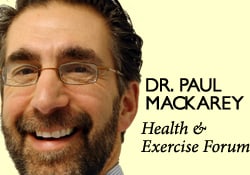 10th ANNIVERSARY Series of 5 Columns Celebrating Life! Part 4 of 5
10th ANNIVERSARY Series of 5 Columns Celebrating Life! Part 4 of 5
“Health and Exercise Forum” by Dr. Paul Mackarey, completes its 10TH year in June of 2015 …THANK YOU! Thank you for your kind words, positive (and negative) feedback in the form of phone calls, texts, emails and simple chats on the streets. I am grateful and humbled. In honor of the 10th anniversary of “Health and Exercise Forum,” I decided to write a series of columns that encapsulates the most important messages regarding health and wellness, base on current wisdom. Readers in NEPA seem to be consistently interested in is health, wellness and longevity. While I have written about this repeatedly, in many different ways, over the past 10 years, I thought this would be the perfect time to share some new information. Please enjoy and embrace the wisdom of those centenarians both from NEPA and from around the globe and let me know your thoughts.
BLUE ZONES
Academics have long suspected that there are specific clusters of people around the globe who significantly outlive the general population. This concept provoked National Geographic Explorer Dan Buettner, to travel around the world in an attempt to study geographic locations around the world that had the greatest concentration of centenarians. He and his research team further studied their cultures and social habits to determine commonalities among these people and their habitats. He discovered that DNA is only one of many ingredients for a long and healthy life. His book, The Blue Zone, details his findings and here is a summary of what they found…
Buettner and his team identified five specific locations on the planet where people seem to have found the “secrets of a long life:” Sardinia, Italy; Okinawa, Japan; Nicoya, Costa Rica; Ikaria, Greece; Loma Linda, California. But, Buettner and his team were not just impressed with the age of the people they met in these zones, but the active lifestyle they maintained, even at 102 years of age. For example, he met a 94 year old man from Costa Rica, who continues to work as a farmer and a 102 year old woman from Sardinia, who hikes at least 6 miles every day. He designated these “Blue Zones” as special places where several common traits contributed to longevity; strong social structure, plant-based diet, moderate consumption of food and daily physical activity. Researchers hope that with lessons learned from the “blue zones” and their people, in combination with scientific discovery, technology and modern medicine, that other people can create their own healthy spaces, change lifestyles and live longer, healthier and happier lives.
IKARIA, GREECE
Ikaria, Greece, like other Blue Zones, is a small isolated island in the Aegean Sea southwest of the Greek island of Samos. Isolation has fostered strong traditions grounded in family values that emphasize a healthy mind, body and spirit. Inhabitants regularly enjoy the therapeutic benefits of the many natural thermal hot springs on the island. They have 20% less cancer 50% less cardiovascular disease and dementia is almost nonexistent. Locals engage in farming, fishing, and walking through the many hills and mountains on a daily basis. Their Mediterranean diet is rich in olive oil with plenty of fish, fruit, and whole grains, while goat milk and wine are consumed regularly. Each day time is set aside for relaxation in the form of a nap and visiting with family and friends.
Healthy Living in Ikaria, Greece:
LOMA LINDA, CA (PHOTO OR MAP)
Healthy Living in Loma Linda, CA:
Read Dr. Mackarey’s Health & Exercise Forum in the Scranton Times-Tribune every Monday. Next week read: Part 5 of 5 “Longevity”
This article is not intended as a substitute for medical treatment. If you have questions related to your medical condition, please contact your family physician. For further inquires related to this topic email: drpmackarey@msn.com
Paul J. Mackarey PT, DHSc, OCS is a Doctor in Health Sciences specializing in orthopaedic and sports physical therapy. Dr. Mackarey is in private practice and is an associate professor of clinical medicine at The Commonwealth Medical College.